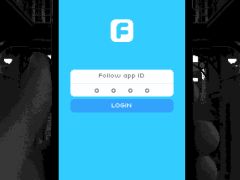Video Gamer is reader-supported. When you buy through links on our site, we may earn an affiliate commission. Prices subject to change. Learn more
Replica is a retelling of sorts of The Talented Mr Ripley, this time through the medium of stealing someone’s life via their iPhone. Which, I must say, is pretty much the last thing I expected when I started it, and while the literary influence sometimes grates this interactive novel-cum-digital paranoia simulator makes some cute points about the connected age.
A pixelart game with no other means of interaction with its world than via an in-game iPhone, your mission is to get into the phone and upload its contents to the authoritarian regime holding you (and the phone’s owner) in jail for subversion. The first order of business, naturally, is getting past the lock screen, and from there you’ll use messages, social media accounts, contact books, and other mainstays of daily life to incriminate your target.
Replica mimics the UI of both the iPhone (albeit one with some Android quirks) and its apps well, giving it a sense of immediacy that it needs to hook you. If you’ve ever used an Apple device, you’ll know how all the ‘mechanics’ work already: badges, push notifications, links, logins, everything. The game’s core appeal, though, isn’t as an smartphone simulator, but that it makes you think about the apps you really use and the data you offer up to them, even if it’s just for the moment you’re playing it. It’s no grand revelation that we give over so much information about ourselves and our habits to the various services we use everyday, but playing with someone else’s life shows how much we give away, and how connected and automatic it all is.
The puzzles which drive the story are all based around picking up scraps of this information, and combining it with other apps or data to dig deeper into the owner of the phone (Dickie Greenleaf) and his life. The government agency holding you hostage has installed a peeking app called To-Do, which enables you to click on info and have it analysed. Progress means clicking the right messages/photos/etc to provide intel to your ‘handlers’, but while the game will prod you most of these puzzles can be solved by drawing from your own real-life experiences.
One of the best of these is found when attempting to crack Dickie’s Twitter client. For a while I was thinking with my abstract, video game-playing brain on. The solution is far simpler. A Twitter account needs an @ account and a password, or in this case passcode. The @ account can be found from posts made to an already cracked Facebook account, and the passcode? Well, just request a single use number be sent to your phone from Twitter support itself.
The rest of the game follows these beats, and the deeper you get the more the game prods at the Bigger Questions. The reason you’re in captivity in the first place seems clear enough: you’re a politically-motivated citizen living in a dystopian America where Homeland Security runs the show, from watching what you do to disabling Airplane mode functionality on your phone. But after a while you’ll find yourself questioning your own motives, the game having nailed the illicit thrill of poking around somewhere you shouldn’t. Are you enjoying this? (Yes.) Shouldn’t you do the right thing and answer the calls and messages from Dickie’s worried loved ones? (Yes.) But do you really, really want to see what he’s got going on in that Instagram account? Yes indeed.
It’s up to you, of course, to choose your own path on the road to one of the 12 endings, and the ‘worst’ ending (the first one possible) is just as instructive as the more ‘positive’ ones. Some of Replica falls flat: the Ripley references seem too on the nose, and navigating a machine made for touch gestures with a mouse can sometimes be unintuitive and fiddly. But it’s also a game which shows how what we now consider to be simple, ‘normal’ acts can be catalysts for disaster. You can’t say fairer than that for a game which costs less than two trips to the toilet in any twatty London pub you can care to mention.
